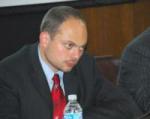
Vladimir Kara-Murza
http://www.worldaffairsjournal...
August 25, 1968, was one of the most important days in the history of the Soviet dissident movement. That Sunday, seven people came out into Moscow’s Red Square in an open demonstration of protest against the invasion of Czechoslovakia. Soviet tanks had rolled into that country on August 21st in an effort to suppress the “Prague Spring”—a dangerous precedent of political liberalization in the Communist bloc. Soviet newspapers demonstrated “nationwide support” for the invasion, while “workers’ collectives” across the country passed on-cue resolutions in favor of Operation Danube.
At noon on August 25th, seven people—Larisa Bogoraz, Konstantin Babitsky, Vadim Delaunay, Vladimir Dremlyuga, Pavel Litvinov, Natalya Gorbanevskaya, and Viktor Fainberg—sat down by the Place of Skulls on Red Square, across from the Kremlin’s Spasskaya gate. The demonstration was silent; the protesters raised a small Czechoslovak flag and makeshift posters reading “Long live free and independent Czechoslovakia!,” “Down with the occupiers!,” and, perhaps most famously, “For your freedom and ours!”
Within minutes, the protesters were seized by the KGB. During their trial for “anti-Soviet propaganda,” not one of them admitted guilt—they all insisted that they were acting in accordance with the Constitution by protesting an action of the government with which they disagreed. Bogoraz, Babitsky, and Litvinov were sentenced to internal exile; Delaunay and Dremlyuga were sent to prison camps. Gorbanevskaya and Fainberg received the most horrific punishment of all—they were declared “insane” and sent to “psychiatric prisons,” where they endured not only incarceration, but also torturous “treatment.”
“A nation minus me is not an entire nation. A nation minus ten, a hundred, a thousand people is not an entire nation. So [the authorities] could no longer say that there was nationwide approval in the Soviet Union for the invasion of Czechoslovakia,” Gorbanevskaya recalls in They Chose Freedom, a documentary film on Soviet dissidents that has just been translated and produced in English. “For me … going to that demonstration was a selfish move. I wanted to have a clean conscience.”
“For the citizens of Czechoslovakia, these people were the conscience of the Soviet Union,” Vaclav Havel, himself a dissident who would become the first president of post-communist Czechoslovakia, said of the Red Square protesters. They, and hundreds and thousands of other Soviet dissenters who stood up for human rights and civic dignity even when it meant severe and unavoidable punishment, were indeed Russia’s conscience—and a reminder that a nation should never be equated with its authoritarian rulers.
Vladimir Kara-Murza's blog
























